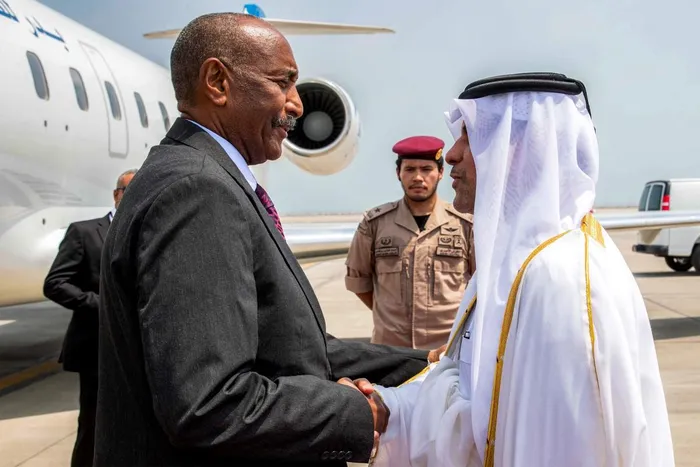AU Paralysis Fuelling Sudan's Humanitarian Catastrophe

Qatar's Deputy Prime Minister and Minister of State for Defence Affairs Sheikh Saud bin Abdulrahman al-Thani (right) receiving Sudan's military leader General Abdel Fattah al-Burhan in Doha on September 15, 2025.
Image: AFP/QATAR NEWS AGENCY
Kim Heller
'All Eyes on Gaza' has become a vociferous rallying call, as it should, for Gaza is a site of horrific inhumanity. At the same time, more eyes are needed on Sudan.
The conflict-ravaged nation is a humanitarian crisis, yet the world hardly looks upon the atrocities of Sudan. The war between the Sudanese Armed Forces (SAF), commanded by General Abdel Fattah al-Burhan, and the Rapid Support Forces (RSF), led by Mohamed Hamdan Dagalo, is in its third year. Sudan is in a disastrous downfall.
Many cities have been annihilated and are little more than heaps of ruins. Blockades and drone attacks are the day-to-day horrors of Sudan. Just weeks ago, seventy-five worshippers at a mosque were targeted and slaughtered. Multiple hospitals have been rendered dysfunctional due to the continued barrage. This has not only left the ill and injured without health care but has resulted in the spread of serious diseases, including cholera.
With close to 13 million people displaced, Sudan is currently 'home' to the most significant displacement emergency in the world. Over 25 million people face critical food insecurity. At least 150,000 people have been killed as a direct consequence of the warring or due to famine and illness caused by the conflict.
Despite all this horror, the suffering of Sudan is barely reported in newspapers or featured on news channels. It garners a scrap of newspaper column width compared to Ukraine, and a tiny trace of prime-time television time.
This egregious media inequality raises questions about the racial hierarchy of human suffering and empathy. Do Black lives matter less? There needs to be more eyes on Sudan - not only to bring an end to the war but to reveal the forces behind it.
Noam Chomsky examines war and conflict through the lens of power and imperialism. He writes that disputes are often manufactured or aggravated by world powers, especially the United States, as a means to support or strengthen global hegemony. He writes of imperial and proxy wars as "engineered by superpowers to secure resources, markets, and influence, often under the cover of 'humanitarian' or 'defensive' activities.
Such wars, Chomsky argues, involve explicit military invasions or arming proxies, ushering in sectarian violence and long-term instability. It is through these proxy wars that foreign powers propel their imperial interests and gain significant geopolitical advantage.
This is indeed what is happening in Sudan. The battle in Sudan is not just a prolonged domestic conflict. It is a foreign proxy war. Egypt and Saudi Arabia have been accused of supporting and providing weapons to SAF, while the United Arab Emirates has been accused of arming RSF.
Furthermore, while America likes to position itself as a benevolent intermediary invested in peace talks, its real interests rest in the nation's gold and oil reserves, as well as its geopolitical gem, the Red Sea coast.
Foreign arms and financial assistance, and in some instances, even mercenaries, are still being supplied to the rebel RSF in Sudan. Oddly, while the UAE, Saudi Arabia, and the US provide humanitarian relief, their geopolitical ambitions thirst for minerals, and military activity in Sudan help sustain the crisis. This makes them untrustworthy peacemakers.
At the recently held United Nations General Assembly in September, the US, Egypt, Saudi Arabia, and the UAE announced a project for a three-month ceasefire in Sudan, followed by a nine-month transition to civilian rule. This brief moment of grand optimism did not last long. Egypt's push for a stronger condemnation of the RSF was swiftly rejected by the UAE. There were also no concrete plans to impose an arms embargo.
During his address at the 80th UN General Assembly session in September, the UN Secretary-General António Guterres was emphatic that there was no military solution to the crisis. He implored all parties to "end the external support that is fuelling this bloodshed" and protect civilians.
Scenes of mothers burying their deceased toddlers must end. Refugee camps, filled to the brim with displaced families, are collapsing. Neighbouring countries such as Chad and Ethiopia are unable to take in any more anguished Sudanese.
The AU has the capacity to impose sanctions and mobilise humanitarian resources. Still, the AU has outsourced its role and responsibility regarding Sudan to the foreign Quad. This undermines its grand principle, "African solutions to African problems."
The AU's voice is hardly audible. Although there has been a pile of high-level correspondence and speeches condemning the atrocities, there has been no strong condemnation of the foreign countries fuelling the conflict. This is not only an act of cowardice but betrayal.
The situation in Sudan requires an immediate ceasefire, followed by a legitimate phase of rebuilding. This is the work of the local Sudanese and the AU. The AU should decisively convene an African-led peace forum. It does not require foreign involvement. The AU has both the capacity and the mandate to do this.
The AU must demand that Egypt, Saudi Arabia, and the UAE stop fueling the conflict and stop the supply of arms with immediate effect. Once the conflict has been quelled, Sudanese civilians and civil groups, rather than military groups, must be placed at the centre of restoring Sudan.
The lives of Sudanese are no less precious than those in Gaza or in Kyiv. For the world to turn its gaze away is shameful. For the African Union not to be watching the situation like a hawk is an act of passive complicity. God help the people of Sudan.
* Kim Heller is a political analyst and author of No White Lies: Black Politics and White Power in South Africa.
** The views expressed do not necessarily reflect the views of IOL, Independent Media or The African.